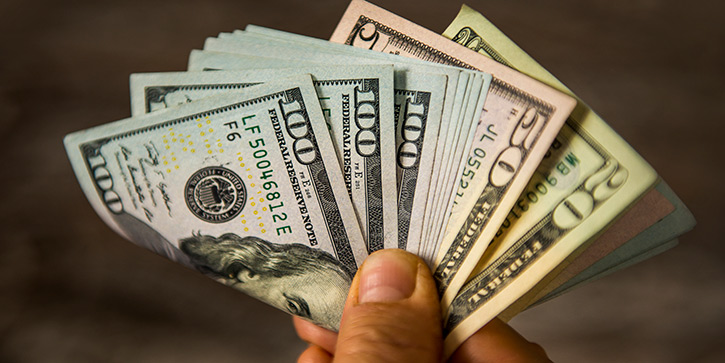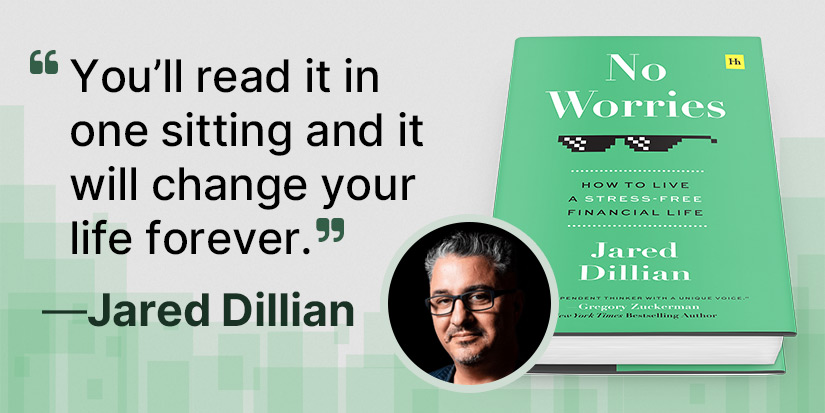
The Things You Can Do With Cash
-
 Jared Dillian
Jared Dillian
- |
- July 26, 2018
- |
- Comments
Before we get started, let’s do a recap of our personal finance series.
In Week 1, we talked about attitudes towards money.
In Week 2, we talked about scalability being the key to wealth.
In Week 3, we talked about the importance of saving cash.
Today, we are talking more about cash, and all the great things you can do with it.
|
Part 1: Actual Cash
First, we are going to talk about actual hard currency. I am an advocate of having more.
Lots of people (especially young folks) dislike cash. They say you can get pretty much whatever you want with a credit card.
True, but—
- Now you have a credit card bill, and not many people pay it off every month.
- There is an electronic record of your transactions.
I will cop to being a bit like those libertarian anti-government types, and I like the anonymity of cash. Not that I’m doing anything illegal or suspicious, but the government doesn’t need to know where I go to lunch every day.
I generally carry around $500-$1,000 in cash, because of the optionality of it (more on this in a second). If there is something I want to buy that is slightly expensive, I don’t need to put it on the credit card.
Am I worried about getting mugged? Not really. The $500 or $1,000 I would lose is probably less than most people pay in credit card interest in a year. If you can’t pay it, you probably have too much leverage.
It is also good to have some cash hidden in the house somewhere. The example I always use is: a giant storm cuts power to the entire state, knocks a tree on your house and the ATMs don’t work. How do you get the tree off your house? $5,000 in cash should do the trick.
Lots of personal finance experts will tell you that it is good to have $10,000 laying around in case of emergency. I am telling you that you might want to have it in actual cash.
I am way more paranoid than you. I can think of a hundred different ways things can go wrong where you might need $10,000 (or more) in cash.
Like what you're reading?
Get this free newsletter in your inbox every Thursday! Read our privacy policy here.
Optionality
Optionality means different things to different people. It has a very specific meaning to finance people who have studied option theory. An option is the right, but not the obligation to buy something at a certain price by a certain time.
More succinctly, it is a choice.
When you go to the grocery store, you can choose between Original Speed Stick deodorant, or Irish Spring Speed Stick deodorant. That choice has intrinsic value. If you did not have a choice between Original or Irish Spring, you would actually be poorer.
Bernie Sanders once complained that we have 23 different kinds of deodorant. The fact that we have a choice among 23 (or more) different kinds of deodorant is what makes this country so rich. It’s not the deodorant—it’s the choice. Some places don’t have that choice—they only have one government-issued brand of deodorant. The most important thing that capitalism gives us is choice.
Anyway, if you are cruising around with only a couple of bucks in your wallet, you have very little optionality. There are very few things you can buy without borrowing money.
And remember, lots of places offer discounts if you pay in cash, including gas stations, restaurants, doctor/dentist offices, and jewelry stores. I have saved a lot of money on this over the years. And the discounts are usually greater than whatever points/miles I would earn on the credit card, so don’t come at me with that.
In a Larger Sense
But this is the more important aspect of cash—if you have liquidity, then you have opportunities.
Life will throw opportunities at you from time to time. Once, a friend of mine showed me a hedge fund that I thought was a can’t-lose proposition.
I was able to take advantage of that opportunity because I had lots of cash laying around. It ended up being a good opportunity! I made money on it.
Let me drive this point home again—stocks are not cash. It is not “money in the bank.” Say you were fully invested in a stock portfolio, with no cash, and this hedge fund opportunity came along. You would have to sell some stocks to raise cash.
But maybe you don’t want to sell the stocks! Maybe you think they are still good investments. Maybe you don’t want to pay the tax bill on your gains, or maybe you don’t want to sell at a loss.
So it becomes a hard decision. Once you spend your cash and you acquire assets, it because difficult to clear the psychological hurdles to part with those assets. This is known as the endowment effect.
Most people don’t get hedge fund opportunities, but they will get real estate opportunities. I was able to make a bid very quickly on the house I am living in because I had cash laying around. This house has been the smartest decision I have made in my entire life.
How many times has there been a house you wanted to buy but it was just impossible to get your financial s--- together to do it?
It’s not just hedge funds and houses. It’s businesses, it’s dental offices, it’s RV parks—at some point in your life, someone is going to come to you with a great opportunity and you won’t be able to take advantage of it unless you have the liquidity.
Like what you're reading?
Get this free newsletter in your inbox every Thursday! Read our privacy policy here.
The Perils of Being Fully Invested
Cash has such an awful, awful reputation—especially after this big bull market. Cash is a “drag on returns.” It’s a race to see who can be the most fully invested—maybe even on margin.
There is nothing more dangerous than being “fully invested.” Being fully invested means that you have no options—because you have sold them all.
It can be a bit frustrating sitting on a big pile of cash, waiting for opportunities (especially in the stock market).
But would you rather:
a) Miss out on stock market gains, or
b) Be fully invested when the market drops 30% and have no “ammo” to take advantage of it?
I would rather a), because I would have the opportunity to buy stocks cheap if the market dropped 30%.
B) is the worst position of all—and most people freeze up, too scared to sell, too scared to buy. There is nothing better than the smug satisfaction of scooping up cheap assets while everyone who was “fully invested” is puking them. That has happened a couple of times in my life.
Final Note
Did you guys get to watch my ETF video on Monday? Let me know what you thought.
The event it was part of, Bull or Bust: Navigating the High-Speed Train Wreck, is still on right now. You can check out the latest presentation from Patrick Cox here.
Mauldin Economics tells me there’s something pretty great coming your way next week too. You might want to check your email on Monday.__________________
1 By the way, this applies to not just investments—but toys as well. You can’t buy something fun if you don’t have the cash.
subscribers@mauldineconomics.com
Tags
Suggested Reading...
|
|

 Jared Dillian
Jared Dillian

